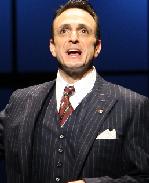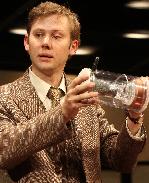SITE GUIDE
SEARCH
REVIEWS
REVIEW ARCHIVES
ADVERTISING AT CURTAINUP
FEATURES
NEWS
Etcetera and
Short Term Listings
LISTINGS
Broadway
Off-Broadway
NYC Restaurants
BOOKS and CDs
OTHER PLACES
Berkshires
London
California
New Jersey
DC
Philadelphia
Elsewhere
QUOTES
TKTS
PLAYWRIGHTS' ALBUMS
LETTERS TO EDITOR
FILM
LINKS
MISCELLANEOUS
Free Updates
Masthead
Writing for Us
A CurtainUp Review
The Farnsworth Invention
By Elyse Sommer
|
It's gonna change everything, it's gonna end ignorance and misunderstanding, it's gonna end illiteracy. It's going to end war.— David Sarnoff, denying his wife's accusations that he is obsessed with getting around Philo Farnsworth's claim to credit for the invention of domething she refers to as "a ridiculous thing which will at best be a toy for rich people."
|

Hank Azaria in The Farnsworth Invention
(Photo: Joan Marcus) |
What we have here is a David and Goliath struggle — David being Philo Farnsworth (Jimmi Simpson), a young genius who was 12 years old when he had his monumental concept moment in an Idaho potato farm field; with David Sarnoff (Hank Azaria), the head of the Radio Corporation of America, being the Goliath who wants to control the patent rights after the young inventor has managed to get funding to bring his concept to fruition.

Jimmi Simpson in The Farnsworth Invention
(Photo: Joan Marcus) |
Klara Zieglerova has created a chalkboard scrim curtain on which Farnsworth's entire television concept is scribbled. This opens on to a slick, red and black two-tier set which has the entire cast lined up as a backdrop for a prologue by Azaria's Sarnoff. From there it's back in time to a ninth grade Idaho classroom where Farnsworth (Christian M. Johansen) tries to persuade his science teacher, Mr. Tolman (Jim Ortlieb), to let him skip basic science and move right into chemistry. He does, and the action then skips forward to Farnsworth (now played by Simpson) this time trying to persuade the heads of the local community chest to help him get his television project funded. His persuasive powers yield the necessary additional funds from banker Bill Crocker (ames Sutorius) and also get his girl friend Pem (Alexandra Wilson, excellent in this as well as her subsidiary roles) to throw in her lot with him.
Hank Azaria, as the aggressive, expensively dressed self-made mogul and Jimmi Simpson as the rumpled, country boy genius contrast each other nicely. Under Des McAnuff's never stopping to catch its breath direction they segue smoothly from narration to active participation. Most of the funny dialogue goes to Azaria, with his above quoted vision about the future of television drawing the most laughs from audiences who have seen this lofty invention transformed into a vast "wasteland" or "the boob tube."
Simpson is saddled with much of the lengthy technical talk (the play generally is bigger on talk than heart-grabbing emotion), though he gets the occasional one-liner (he comments on Crocker's observation about the correlation between music and science with "music is what mathematics does on a Saturday night"). The meeting between Farnsworth and Crocker, when Farnsworth proves to be a musical as well as science virtuoso, is probably a Sorkin invention to spice things up. The scene in which a 10-year-old Sarnoff tells off a Russian policeman but then watches his house being burned down is probably another instance of literary license, especially since it ties in with the ruthless Sarnoff trying to justify his greed is good actions and at the same time admitting that "I burned his house down so he wouldn't burn mine down first."
As for the one scene in which Farnsworth and Sarnoff meet face to face, Sorkin actually has Azaria's narrating persona follow this up with a disclaimer that it never happened. What does happen takes us through the trial and error period of the invention, the legal tussle about credit for the patent (which did go to Farnsworth) and the question of who would control television (Sarnoff's win).
Both Sarnoff and Farnsworth have marital problems, though Sarnoff's wife (Nadia Bowers) is a somewhat distant and enigmatic character. Farnsworth's personal problems are exacerbated by the death of his young son. And while television has hardly ended illiteracy or war, Sorkin does find a dramatic clincher in the Apollo 11 launch.
It should be noted that this isn't the first play about the television's invention. Two years ago the Public Theater mounted Rinne Groff's intriguing Ruby Sunrise in which the daughter of an engineer and avid reader of Popular Mechanics and Science and Invention dreams of building and patenting an all electric television set. This fictional character was beat to the patent office by none other than Philo Farnsworth.
Happily, this season is bringing us a cornucopia of straight plays, with two others about science and discovery: Peter Parnell's Trumpery about Darwin's having to deal with the fact that another man has come up with his natural selection concept and Bob Clyman's The Secret Order about a young cancer researcher who may have discovered the cure for cancer. Clyman's play is straight fiction but takes top honors for elegantly handling the chunks of needed technical dialogue so that, to quote our reviewer, even "lengthy speeches about how cells attack each other become epic dramas."
With the re-scheduling necessitated by the stagehands strike, it turned out that I saw Trumpery (watch for our review and Farnsworth on the same day so that I felt a bit like I was back at Junior High School 93 doing a double assignment of the science movies we were required to see each Friday at the Museum of Natural History. Trumpery, like Farnsworth falls into the neither fish nor fowl category— too many factual ambiguities to be a reliably accurate docudrama, and not quite enough dramatic excitement and emotional engagement to be a truly memorable work of the imagination. (Each relies heavily on the death of a child for personal drama). And yet, seeing both in one day made the high stakes games for top spots in the history books more interesting —and put a spin Darwin did not intend on his theory of the survival of the fittest.
LINKS
The Secret Order
Trumpery (this link will work when we post our review after the 12/05 opening)
Ruby Sunrise
Page with links and synopses of other science and technology plays
|
THE FARNSWORTH INVENTION by Aaaron Sorkin Directed by Des McAnuff Cast: Hank Azaria stars as David Sarnoff, and Jimmi Simpson as Philo T. Farnsworth. Other Cast Members in multiple roles: Nadia Bowers, Kyle Fabel, Maurice Godin, Christian M. Johansen, Aaron Krohn, Bruce McKenzie, Malcolm Morano, Spencer Moses, Michael Mulheren, Jim Ortlieb, Michael Pemberton, , Katharine Powell, Steve Rosen, James Sutorius, Margot White, Alexandra Wilson, and William Youmans Sets:Klara Zieglerova Costumes: David C. Woolard Lighting design: Howell Binkley Sound: Walter Trarbach Original Music: , Andrew Lippa Movement: Lisa Shriver Hair and wig design: Mark Adam Rumpmeyer Fight direction: Steve Rankin Running Time: 2 Hours, plus intermission >Music Box, 239 W. 45th St. From 10/15/07; opening 12/03/07 Closing 3/02/08 after 34 previews and 104 regular performances. > |




